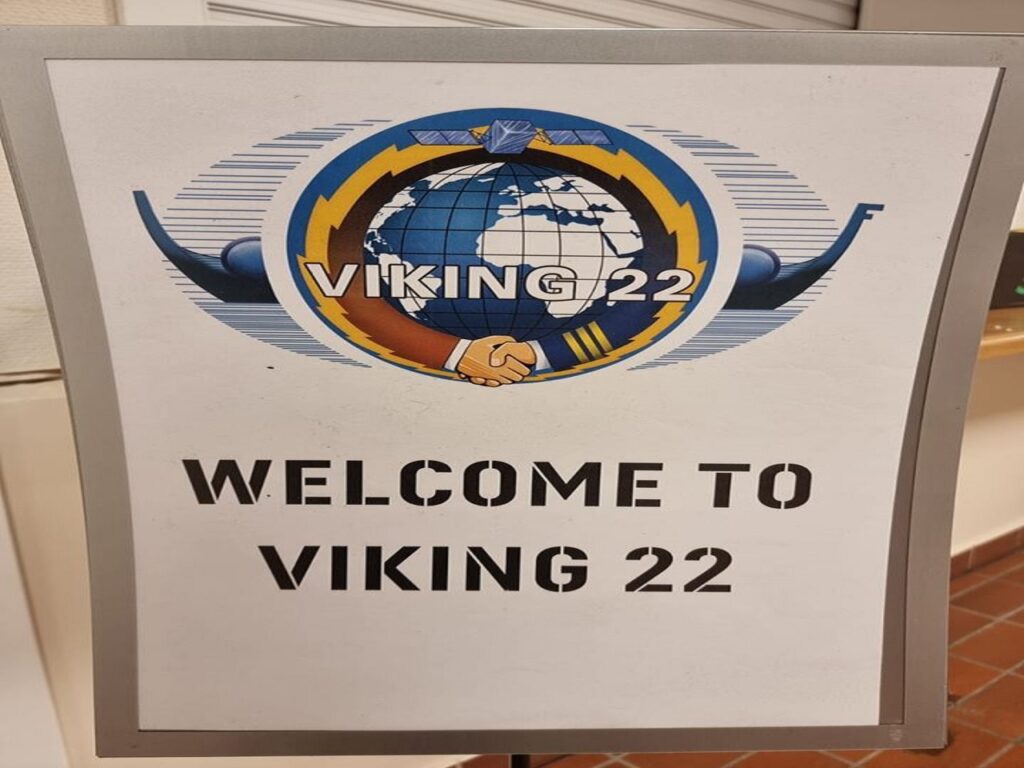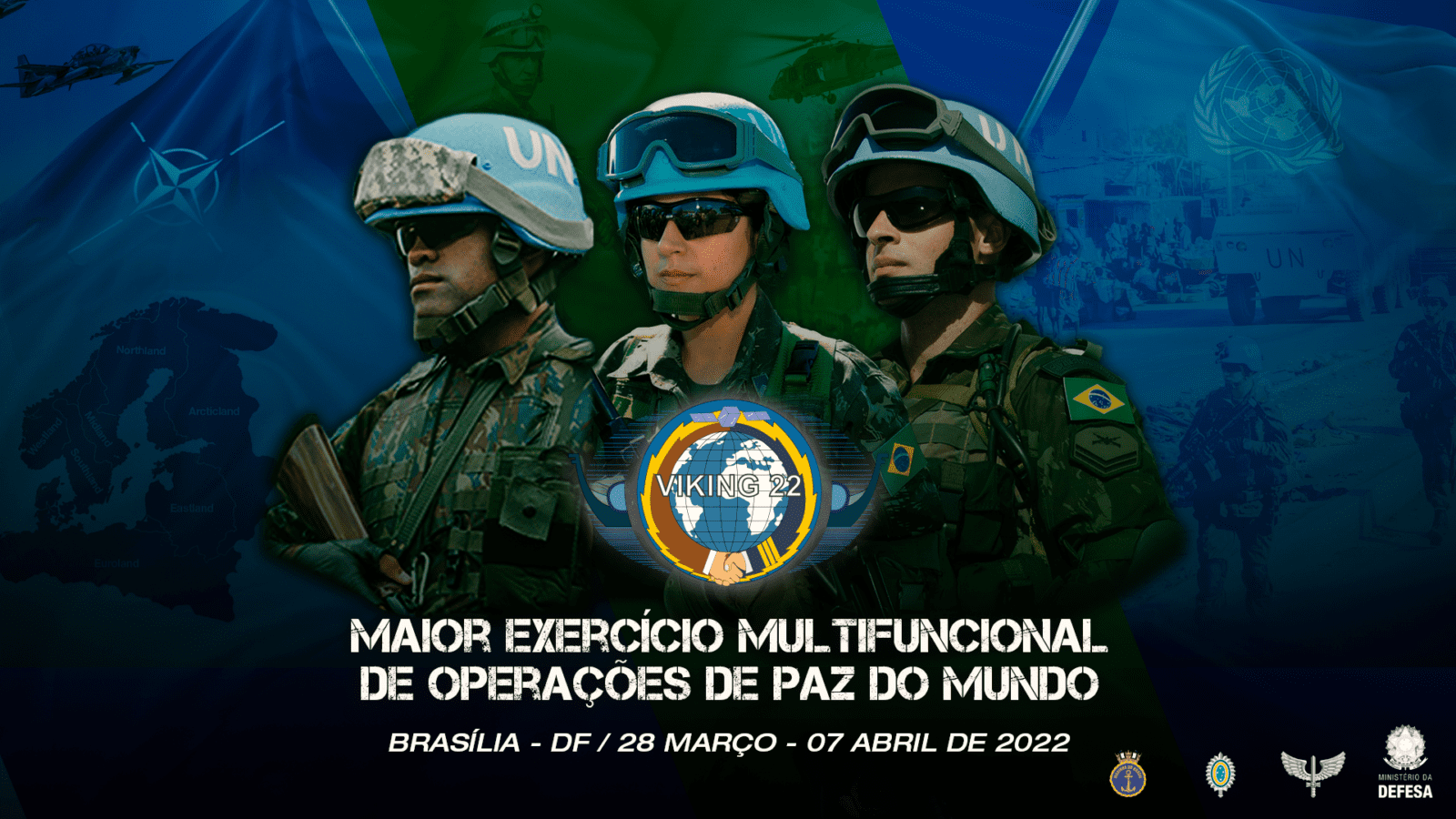Capt Camila de Almeida Paiva Since the beginning of time, communication has been a vital tool for human interactions. Through it, societies have risen, developed, and grown stronger. History teaches us that military forces from different countries have allied to fight a common enemy in the most diverse theaters of operation. With the advent of technology, the distances between cultures have been shortened, but communication between individuals still remains imperative for human relationships, be they personal or professional.
Exercise Viking, which is the largest multinational training exercise for peace operations in the world, conceived and led by Sweden, brings together professionals of various nationalities and can be another example that without communication, goals are hardly achieved. The exercise aims to bring together activities, occurrences, and events related to peace operations in a simulated way in order to simulate the reality of missions and to train its trainees – military, police, and civilians – to work in an integrated way in today’s multidimensional missions, with communication as the key.
As in previous editions of Viking, this year’s edition had, in each of its several remote sites, the participation of the three essential components in a multidimensional mission, either by integrating the Training Audience as players, or in the Observers, Trainers and Mentors Cell (OTM). In this context, communication is of fundamental importance and indispensable for the integration between the components and between the remote sites and for the success of the Exercise itself. In this simulation of a peace operation, in this case the United Nations Mission in Midland (UNMIN), several military, police, and civilian professionals representing different countries and languages participated, with English as the lingua franca of the Exercise. Without proper language skills, the chances of mission noncompliance or partial and deficient compliance tend to be greater, negatively impacting the learning and performance of the participants and, ultimately, the Exercise as a whole.
Taking the above observation out of the simulated exercise context and bringing it to the reality of peace operations, including other military and international missions where communication in English is required (we can mention other languages, but we will limit our focus to the language of Shakespeare), it is easy to see that a lack of language proficiency can lead an institution to failure and tarnish its image.
When a certain order is issued by the top echelon of a given institution, and its lower echelons find it difficult to understand the order, or when the reverse flow of information (from the lower echelons to the top) is not clear and objective, linguistically speaking, the noise in communication can lead to countless negative actions that may lead to doubts about the professional capacity of individuals and the institutions they represent.
We can take as an example a supposed situation where troops deployed on the ground of peace operations are accused of sexual abuse and exploitation. The allegation, if unreal, can become concrete if there is no timely, clear, meaningful, and objective response. And if true, an equally objective, timely, clear, meaningful, and immediate response becomes even more necessary and imperative.
In both situations, the main tool for responding to the local society is communication, which occurs through the effective and efficient use of language, whatever it may be, including the native language. And when it comes to the efficient and effective use of language, this does not mean not making mistakes when using it, which would be a rather unattainable and unfair imposition. Mistakes occur in the use of any language, including the mother tongue. The point is to understand and to make oneself understood in a logical way, and not to express oneself by avoiding, as much as possible, the proper accent, or by trying to match the accent of native speakers of Anglo-Saxon origin, who have accents that are equally different from the accents of the Portuguese spoken in Brazil. As far as oral and written expression is concerned, mistakes, as long as they are primary and have little impact on communication, are natural and acceptable. The search should be for a communicational exchange in which there is no room for doubts that can lead to the loss of the original information. Sender and receiver tuned to the same station.
Taking, again, the example cited above about the alleged case of sexual abuse and exploitation by the troop, we can infer how communication has power, especially through oral communication. Without this tool, and without knowing how to use it correctly, risks to the legitimacy of the mission and to the image of the institution that conducts it, as well as risks to the physical integrity of the facilities and its members, are real. The media, which must seek official data from the Forces, acts as the fourth power and aims to inform society about facts that have occurred in the spheres of governmental or institutional responsibility. The narrative used by the media will depend a lot on the information that is transmitted by the Forces and/or institutions. In turn, this information will influence public opinion, which can react positively or negatively to what is presented by the media. Hence, the need for a solid, not perfect, linguistic command, in order to avoid collateral damage from communication noise.
Highly trained military personnel in their area of expertise may be overlooked because of this linguistic difficulty. Such an observation may be unfair. However, in order to meet increasing challenges, institutions often have the urgency to deploy personnel with appropriate language skills in order to accomplish the mission. There is no time for instant and immediate improvement of language skills. There is no such thing. It is important to stress that language is a skill that, like walking in a balanced way and running efficiently, demands a process that takes a significant amount of time to consolidate and make the individual use it in a confident manner, being more concerned with the content of his or her speech and less with pronunciation and proper grammatical structures. This is one of the traits that characterize being fluent or not in a given language.
It is illusory to believe that weeks or a few months will give you solidity and confidence in using the language, because there is a process that requires patience and dedication. It is similar to learning your native language, in which you are immersed from an early age and still find it difficult at some points. Although it is known to a significant portion of non-native English speakers, satisfactory language proficiency must be maintained on a regular basis and not only be a concern when the likelihood of an international assignment looms. We must go far beyond the comfort zone of “Disney English,” which is the level of language proficiency that is sufficient just to survive on trips (often precariously) to foreign lands or in the environment where English is the official language, even causing psychological factors such as stress and anxiety in individuals.
Another very obvious point is the change in the body language of those who have not mastered the use of English. The more attentive observer easily notices the natural resourcefulness of the individual to speak about a topic of his or her knowledge using the mother tongue: firm gestures, a confident tone of voice, and frequent eye contact with his or her interlocutors. The content and the way of communicating it are not obstacles. However, when this same individual needs to present the same content from his or her area of knowledge in English, we notice a series of elements such as vacant glances, hesitation, low tone of voice, anxious or apathetic gestures, comments not pertinent to the situation (which sometimes require a certain degree of formality), and properly contained but noticeable stress.
This occurs because of a lack of confidence in the use of language. Depending on the topic, this behavior can impact the way the interlocutors view the professional capacity of the individual and, perhaps, the institution he or she represents. For it is not enough to know, one must know how to transmit. There arises, then, the imperative need for adequate and solid communication in English (not perfect, it is fair to remind you) and the ability to use the language in different contexts, whether formal or informal, and for different audiences.
Exercise Viking, being an international activity with many foreign players, has once again highlighted the need we all have for constant and regular language improvement, as is done in the different types of troop training. We must be aware that communication must also be part of the military strategy to show the capabilities and strength that we already have.

About the author:
Capt. Camila de Almeida Paiva – English QCO Captain Camila de Almeida Paiva, has been an instructor and Civilian Protection Focal Point for the Joint Center for Peace Operations of Brazil (Centro Conjunto de Operações de Paz do Brasil – CCOPAB) since 2017. She completed her military training at the Army Complementary Training School in 2010 and at the Officer Improvement School in 2018.
The officer has experience in UN Peace Operations (MINUSTAH, 2014) and courses in the area, such as: Protection of Civilians (India), Civil-Military Coordination (Germany), Gender Advisor (Sweden).
He participated in Exercise Viking 2018 and 2022. Currently, she is part of a UN team revising the Manual for the Protection of Civilians. She is a post-graduate student in International Relations and holds an English proficiency diploma from the University of Cambridge (CPE).
*** Translated by DEFCONPress Team ***
